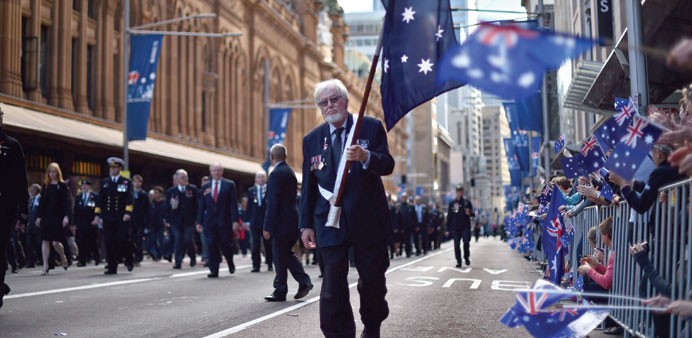A veteran takes part in the Anzac Day parade along George Street in Sydney. Record numbers of
Australians and New Zealanders turned out yesterday to mark the centenary of the Gallipoli landings amid tight security, a formative event that helped forge their identities as independent nations.
DPA/Sydney
Record crowds defied terrorist threats yesterday and attended dawn services across Australia to commemorate the 100th anniversary of Anzac Day, which saw Australian and New Zealand soldiers land at Gallipoli for one of the most famous battles of World War I.
The anniversary was marked with parades and marches of war veterans and their descendants to mark the centenary of the day Australian and New Zealand troops stormed ashore at what is today Turkey.
Reports of threats by Islamic State-inspired terrorists to attack and behead people at the services did not deter hundreds of thousands of people from attending events in towns and cities in Australia.
Ceremonies were also held at Gallipoli and the battlefields of France.
Police were placed on full alert after three 18-year-old men in Melbourne were charged with planning a terrorist attack during the ceremonies.
A 14-year-old boy was being held in custody in Britain after being charged with two counts of inciting terrorism in Australia.
Anzac stands for Australian and New Zealand Army Corps, the ill-fated force sent by the British in the First World War to invade the then Ottoman Empire with the intention of opening up another front to attack Germany.
The disastrous attack ended in a resounding defeat for the Allies.
It lasted eight months and cost 9,000 Australian lives, but has become the focus for Australian nationalism.
Prime Minister Tony Abbott, who attended yesterday’s Gallipoli ceremony, wrote in a newspaper article that the Anzac soldiers “embodied the freedom, the spirit of adventure and the bonds of mateship we hold dear to this day”.
“The Great War was the crucible in which the Australian identity was first forged. The sacrifices of our forebears have left us an enduring legacy of freedom,” Abbott wrote.
Some Australians are more critical of what Anzac has become.
James Brown, an army veteran of Iraq and Afghanistan and a director of a military think tank at the University of Sydney, says that the government has spent $250mn on Anzac commemorations, far more than it spends on the physical and mental well-being of troops who have returned from recent wars.
“A century ago we got it wrong,” Brown wrote in his 2015 book Anzac’s Long Shadow. “We sent thousands of young Australians on a military operation that was barely more than a disaster.”
Brown warned that the lesson of Anzac should be to never again involve young Australians in pointless military conflicts.

